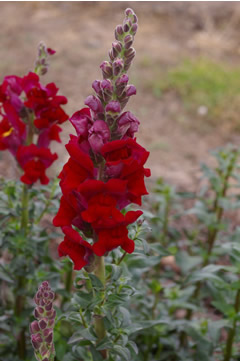Antirrhinum ‘Potomac Red Improved’
go.ncsu.edu/readext?222827
en Español / em Português
El inglés es el idioma de control de esta página. En la medida en que haya algún conflicto entre la traducción al inglés y la traducción, el inglés prevalece.
Al hacer clic en el enlace de traducción se activa un servicio de traducción gratuito para convertir la página al español. Al igual que con cualquier traducción por Internet, la conversión no es sensible al contexto y puede que no traduzca el texto en su significado original. NC State Extension no garantiza la exactitud del texto traducido. Por favor, tenga en cuenta que algunas aplicaciones y/o servicios pueden no funcionar como se espera cuando se traducen.
Português
Inglês é o idioma de controle desta página. Na medida que haja algum conflito entre o texto original em Inglês e a tradução, o Inglês prevalece.
Ao clicar no link de tradução, um serviço gratuito de tradução será ativado para converter a página para o Português. Como em qualquer tradução pela internet, a conversão não é sensivel ao contexto e pode não ocorrer a tradução para o significado orginal. O serviço de Extensão da Carolina do Norte (NC State Extension) não garante a exatidão do texto traduzido. Por favor, observe que algumas funções ou serviços podem não funcionar como esperado após a tradução.
English
English is the controlling language of this page. To the extent there is any conflict between the English text and the translation, English controls.
Clicking on the translation link activates a free translation service to convert the page to Spanish. As with any Internet translation, the conversion is not context-sensitive and may not translate the text to its original meaning. NC State Extension does not guarantee the accuracy of the translated text. Please note that some applications and/or services may not function as expected when translated.
Collapse ▲Trial Started: 2005
Year of Trial: First (from 2005 report)

Good Qualities
Attractive dark red color (4); Strong stems; Long stems.
Problems
Very late to bloom- this could also be a good quality; Didn’t grow as strong as other snaps; kind of ‘spindly’ stems; Most fried – those that survived were unusable; Low productivity, did not recover after the hot weather of summer, short branches below the main flower head, similar to ‘Animation Velvet Red’.
Trial Data
| Plants dead at end of summer (%) | Yield (stems/plant) | Stem Length (inches) | Market Appreciation Rating¹ | Repeat Again Rating¹ | Ease of Cultivation Rating¹ | Average Spacing (in2) | Average Postharvest Life (days) | ||
|---|---|---|---|---|---|---|---|---|---|
| Wholesale | Retail | Consumer | |||||||
| Average | 5.8 | 21.9 | 3.5 | 2.7 | 3.2 | 3.0 | 4.3 | 125 | 9.5 |
| Range of Responses | 1-18 | 13-27 | 2-5 | 2-3 | 2-4 | 1-5 | 3-5 | 36-432 | 5-21 |
¹1 to 5 scale, with 5 being the best. Market ratings are based on sales to wholesalers, retailers, or final consumers direct.
Supplier
PanAmerican Seed
P.O. Box 438
West Chicago, IL 60186
www.panamseed.com



Comments
General comments on trial (Zone 5, applied to all snaps varieties trialed): Trial grown outdoors on green plastic mulch (Solar mulch), trickle irrigation, 4 rows on a 9 x 9 inch spacing, one layer of Hortinova netting put up shortly after transplanting, season was hot most of the summer, but moderated into the fall, and did not frost until late October – during the summer heat, all varieties stopped producing flower heads, but the Group II varieties resumed production in mid-September, yielding about one third of their total production then.